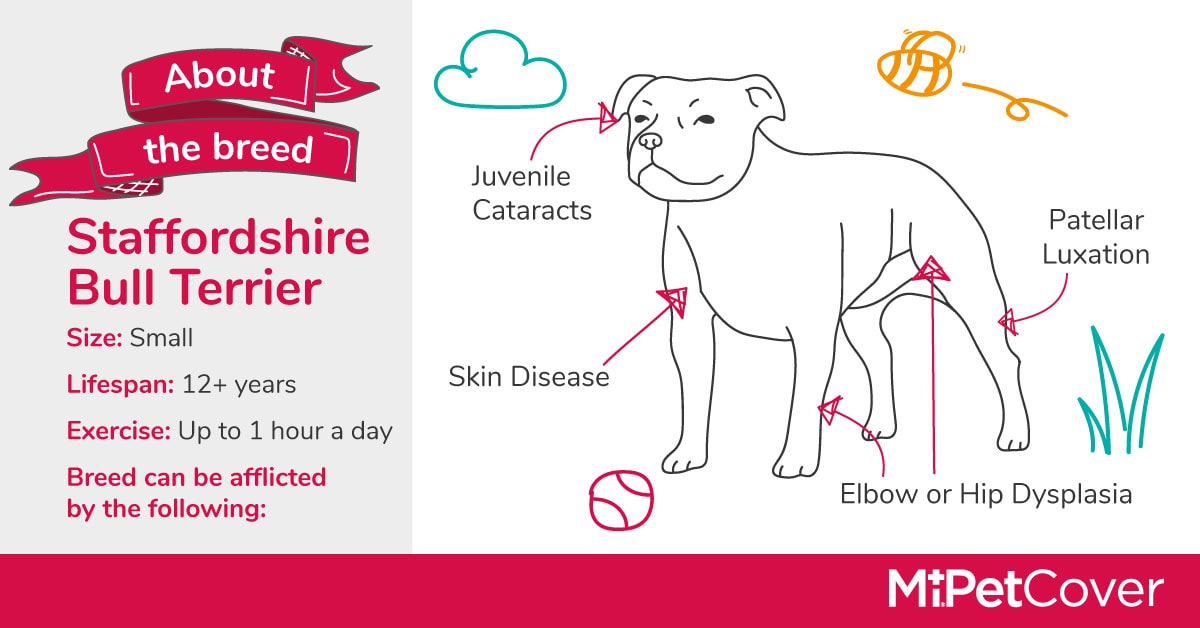Staffordshire Bull Terriers: A Confident and Loyal Dog
One of the most loved dogs in the UK, the Staffordshire Bull Terrier or ‘Staffy’ is a confident and loyal dog.
While they have a reputation for being aggressive, most well-socialised Staffies are loving and trustworthy dogs who get on well with people of all ages, including the children in the family.

Developed within Staffordshire, England in the 19th century, these dogs were once used for bull baiting and dog fighting. While these ‘sports’ are no longer legal, the dogs have retained their muscular physiques and high pain thresholds.
The short coat of the Staffy is easy to keep in good condition and they only need a quick brush once or twice a week. Their fur comes in a range of colours including black, white, brindle, brown and blue. Though rarely reaching heights over 40cm, these dogs are well-muscled and stocky, meaning they tend to weigh about 15kg to 17kg.
A social dog, they crave human companionship and dislike being left alone for too long. They have a cheeky and playful attitude and a real zest for life. Some are prone to anxieties, including separation anxiety and noise phobias.
These dogs need excellent socialisation from a young age in order for them to live alongside other pets including cats and dogs. If this does not occur, they may find it hard to tolerate other dogs and are likely to chase any cats away.
Health Issues in Staffordshire Bull Terriers
With a lifespan of 12 to 14 years, there are a few medical issues we need to be aware of. However, these dogs are hardy and usually enjoy very good health.

- Atopic Dermatitis. Those with atopic dermatitis are genetically predisposed to developing itchy skin. As they lick, chew, rub, scratch and bite at their, skin secondary bacterial and fungal skin infections occur. Signs typically show between one and five years of age and dogs are often affected on their face, belly and paws. The gold standard is to perform allergy testing and, when needed, to start immunotherapy injections to build tolerance. This course can cost over a thousand pounds and can take up to 12 months. Frustratingly, signs don’t always disappear though they do tend to improve.
- Patellar Luxation. Knee caps that pop in and out of place can cause Staffies to hold one of their back legs up periodically. Dogs cannot properly extend their knee joint and will develop arthritis and associated pain. Mild cases can be managed with pain medicine, anti-inflammatories and interventions such as hydrotherapy. More severe cases benefit from orthopaedic surgery, which can cost several thousand pounds. Importantly, dogs commonly go on to develop symptoms in their other knee over time.
- Demodectic Mites (Mange). Staffies tend to be more prone to this external parasite than other breeds. Symptoms can include fur loss and scaly skin. Interestingly, patients are not generally itchy. A deep skin scrape is required to make a diagnosis. While topical medicine can treat localised cases, widespread infections require dips and oral medicine.
- Juvenile Cataracts. These cataracts appear in the first few years of life. We will see a milky blue film over the affected eyes. For some, the vision is not greatly impaired and no treatment is needed. For others, they struggle to see and live a normal life, so will require surgical intervention. Surgery is specialised and not inexpensive.
An energetic and kind-hearted dog, Staffies are a popular breed within the UK. They rely heavily on human interaction though are independent when at home. Remember that ‘bad reputations come from bad owners’ and every Staffie deserves a chance.
Looking for Staffordshire Bull Terrier insurance?
As with any pedigree or cross-breed, it’s always a good idea to have a dog insurance policy in place to help with unexpected vet fees.
If you’re introducing a Staffy puppy to your home, why not take a look at our four weeks’ free WalkawayCover* created especially for new pups aged 8 weeks to one year?
*Puppy must be between 8 weeks and 1 year old and is subject to a CVS health check. WalkawayCover covers illness and accidents instantly. Not all breeds of dog are eligible.
You might also be interested in…
Get a quote in minutes…

Existing customers
Call now on 0808 164 7999
to discuss your policy with us.
Monday - Friday: 08:00 - 20:00 Saturday: 09:00 - 14:00





 Back
Back
